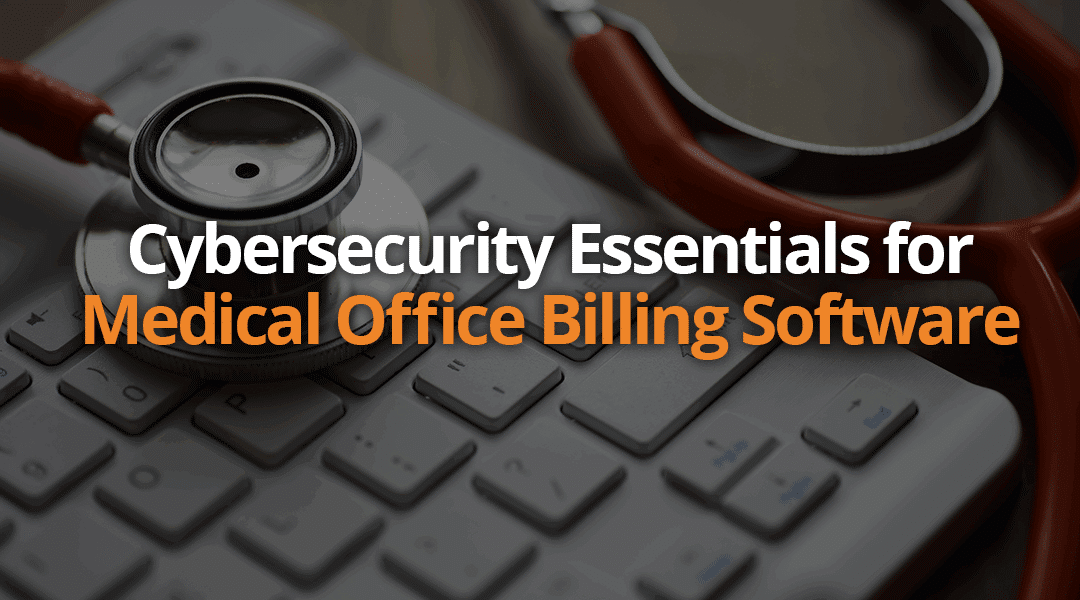Every day, your office handles sensitive patient data, including names, birthdates, insurance details, Social Security numbers, and medical histories. That information isn’t just valuable to you and your patients, it’s also a prime target for cybercriminals.
Cybersecurity threats are increasing in healthcare, yet many practices lack the necessary resources to ensure HIPAA-compliant protection against attacks.
You can protect your organization and patients with the right medical office billing software. A solution like EZClaim is built with protections to keep your data secure and your office HIPAA-compliant.
What is the Role of Cybersecurity in Medical Office Billing Software?
Your software is the first line of defense when it comes to protecting digital records. There are additional safeguards you can use, but every claim, payment, and patient record flows through your software. If it isn’t secure, neither is the data.
Manual processes, generic spreadsheets, and outdated systems leave your office wide open to threats because they aren’t designed to protect against modern cyber risks. They can’t alert you to suspicious activity or encrypt sensitive data, for instance.
That’s why using medical office billing software with strong built-in cybersecurity features is a necessity. You need something built to protect your data from the inside out, with automatic updates, access controls, encryption, and secure backups.
Core Strategies to Enhance Cybersecurity
The right medical office billing software can actively protect your practice from data breaches, HIPAA violations, and ransomware attacks. But that only happens if your software includes the right security features.
Here are some strategies you should use to protect sensitive data:
Use HIPAA-Compliant Software
HIPAA-compliant software should have three key features: built-in encryption, secure hosting, and audit tracking.
- Built-in encryption ensures that sensitive data is unreadable to anyone who shouldn’t have access.
- Secure hosting means your software is backed by a trusted infrastructure with firewalls, intrusion detection, and automatic updates.
Audit tracking logs what was accessed, when, and by whom in case of an audit or investigation after a data breach.
Implement Access Controls
Minimize accidental errors and protect against insider threats with role-based permissions that restrict open access to sensitive billing data. Additionally, require strong passwords and turn on multi-factor authentication (MFA) to prevent unauthorized logins. With user activity monitoring, you’ll always know who accessed what and when.
Use Secure In-App Payment Collection.
Redirecting patients to third-party payment sites can expose them and your practice to unnecessary risk. A secure, built-in payment system keeps everything in one place and ensures PCI compliance.
Look for tools that encrypt financial data and integrate seamlessly with your billing platform. Patients get a smooth experience, and you get peace of mind knowing payments are handled securely.
Train Staff on Cybersecurity Best Practices
Even the best software can’t protect your practice if your team isn’t on board. Regularly train staff on phishing scams, password safety, and proper use of devices inside and outside the office.
Create clear protocols and reinforce them often so that cybersecurity becomes part of your everyday culture – not just something you discuss after the fact.
Strengthen Cybersecurity with EZClaim Medical Office Billing Software!
With threats like data breaches and ransomware on the rise, your medical office billing software needs to do more than process claims. It needs to protect everything behind them.
You don’t need to be a cybersecurity expert to keep your patient data safe. You just need the right tools. From encrypted data and secure hosting to user access controls and audit tracking, EZClaim is designed to help your practice stay HIPAA-compliant and secure.
Explore EZClaim’s features online to see how simple cybersecurity can be.
Frequently Asked Questions
What makes billing software HIPAA compliant?
HIPAA-compliant billing software protects patient health information with built-in safeguards, such as data encryption, secure user access controls, automatic timeouts, audit logs, backup systems, role-based permissions, and regular password updates.
Is cloud-based software more secure than on-premise tools?
On-premise tools often rely on local servers that are harder to secure and maintain. Reputable cloud-based medical office billing software is hosted in secure environments with firewalls, encryption, and 24/7 monitoring. These systems are constantly updated to defend against new threats.
How often should medical practices review their cybersecurity protocols?
At least once a year, or any time you change software, update systems, or expand your team. Consider refreshing staff training every 6–12 months to reinforce good habits and keep them up to date on new risks.


